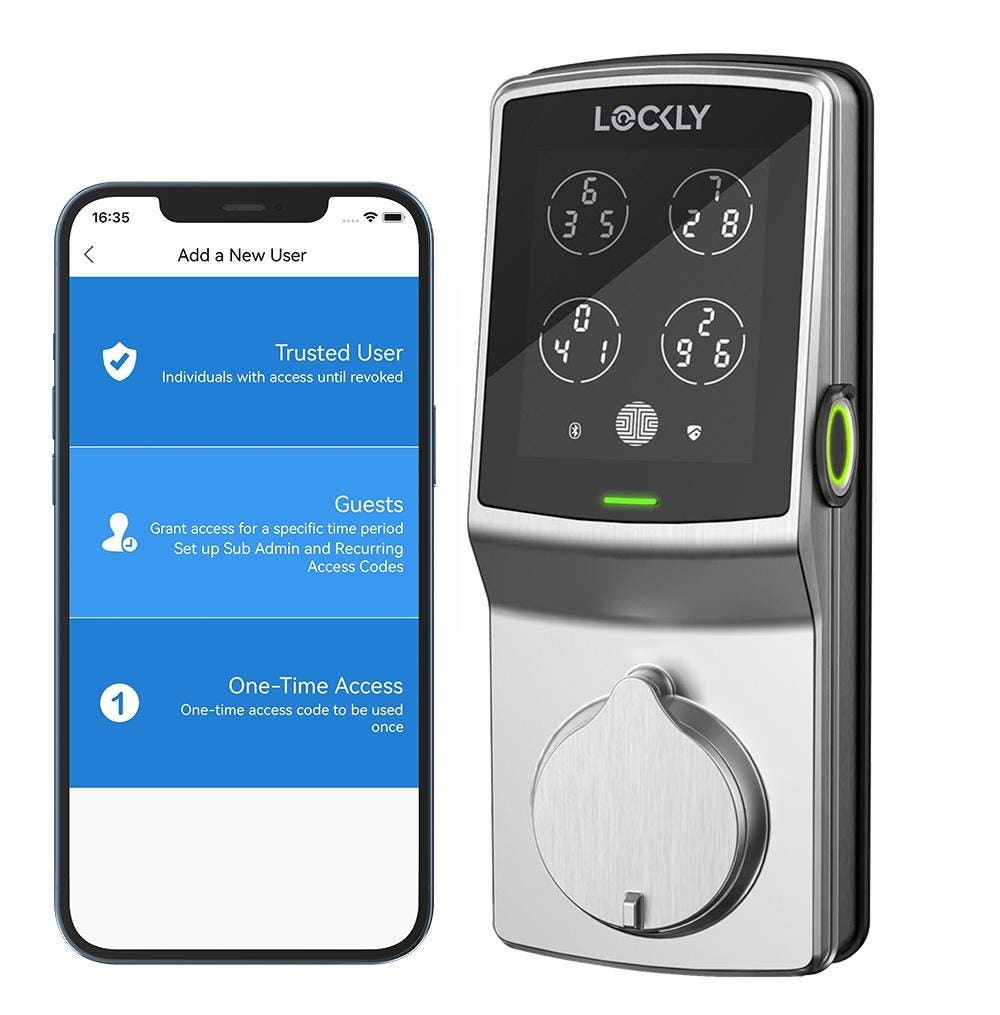In an effort to make my house smarter and more accessible, I decided a few years ago to put a smart lock on the front door. The device I chose, the Nest x Yale smart lock, has made unlocking and locking my door easier than ever. (It’s also true being knee-deep in the Nest ecosystem helps; the thermostats sure have a halo effect.) Tapping in my passcode is more accessible than tediously testing my hand-eye coordination with a standard key. Likewise, locking the house is as simple as pressing on the Yale logo atop the touchpad. Of course, all this can be done with a few taps in the still-kicking-around, OG Nest app on my phone.
The moral? Smart home tech is more than convenience. It’s accessibility.
So it goes with the products from Lockly. At first blush, Lockly seems a competitor with Google for securing your smart home: Lockly sells a variety of locks, all which work with an app available on iOS and Android. What distinguishes Lockly from an accessibility perspective is its Dementia-Proof Secure Plus Smart Lock. Lockly says the Dementia-Proof lock, priced at $249, is the perfect product to use if someone has a family member “who may need to have their access restricted or supervised.” In addition, Lockly says the lock is suitable for “homes, families, kindergartens, daycare, adult care, and schools.” The deadbolt has a removable thumbturn so as to prevent an elderly person or child from literally opening the door to potentially dangerous situations.
“The embrace of assistive technology among elderly individuals is steadily increasing and attracting substantial attention. As technology continually evolves and our population ages, the advantages of these innovations in improving the lives of seniors are becoming more apparent,” Steve Gibson, Lockly’s senior advisor of worldwide sales and marketing, said to me in an interview over email. “From intelligent home gadgets that prioritize safety and ease to wearable health trackers and communication aids, the realm of assistive technology is undergoing rapid expansion. This movement is propelled by a shared aspiration to empower seniors, allowing them to sustain their autonomy, foster connections, and efficiently oversee their well-being.”
Gibson explained the team at Lockly built the Dementia-Proof lock largely because they saw a hole in the market. To wit, Gibson cited a statistic the company came across that said there are more 6.7 million Americans aged 65 and above are currently dealing with Alzheimer’s or dementia; the number is expected to double by 2060. This is important not only for the welfare of older Americans—it matters to their families too. As I’ve written in the past, the reality is most elderly people are given care by loved ones who know them best. Safety is obviously Lockly’s utmost concern, but there’s certainly something to be said for a caregiver’s peace of mind. Gibson said people with Alzheimer’s or dementia are prone to opening locks, including smart ones, and end up “often wandering out unbeknownst to their caregivers.”
“We became aware of the unique challenges posed by this which inspired our product development team to prioritize the safety of these individuals as a core aspect of our solution. Issues such as potential wandering, increased security needs, and cognitive complexities guided our efforts,” Gibson said. ”The result is a solution designed to provide caregivers with a heightened sense of control, independence, and peace of mind. This reality underscores our commitment to innovating technology that acts as both a safeguard and an enabler, promoting dignity and resilience in the face of cognitive challenges.”
As has been established, what separates the Dementia-Proof lock from, say, the Nest lock sitting on my door is ultimately safety. As Gibson pointed out, the removable thumbturn prevents a person with cognitive disabilities from opening the door and wandering away. Installation, he added, takes only a few minutes. All told, Gibson said the Dementia-Proof lock “seamlessly [integrates] advanced security with thoughtful design” and ”exemplifies the fusion of technology and compassion, effectively transforming challenges into meaningful, practical change.”
Asked about the reception from customers, Gibson told me feedback has been “truly heartening.” Gibson shared anecdotes about the Dementia Proof lock helping a family safeguard their autistic child from wandering, while another family remarked positively about Lockly’s PIN Genie keypad—technology, the company says, “prevents codes from being guessed by randomly shuffling PIN number locations”—as a virtual barrier for unauthorized access. According to Gibson, PIN Genie is an “appreciated extra layer of security” by Lockly customers.
“At Lockly, we place a lot of importance on listening to our customers,” Gibson said. “Their feedback is instrumental in guiding us to make continuous improvements across all our products. It’s our firm commitment to understanding and meeting the needs of our users that drives us to create solutions that truly make a difference in their lives.”
The Dementia-Proof lock represents Lockly’s dent in the universe.
“Our aspiration is rooted in creating a meaningful impact on the lives of users by providing innovative solutions that genuinely enhance their daily routines,” Gibson said of Lockly’s goals. “Specifically with the development of our Dementia-Proof smart lock, we are driven by the thought of empowering both seniors and their caregivers. Our hope is to create a safer and more convenient environment that fosters independence and eases the challenges often encountered by many caregivers.”
Read the full article here





